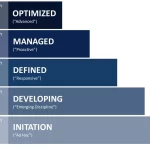The skills required for a knowledge management team member ranges from business awareness to management skills, learning abilities, communication and interpersonal skills, as well as information management and information technology expertise.
KM professionals should be proficient in retrieving information, evaluating or assessing information, organizing and analyzing content, presenting content, ensuring the security of content, and collaborating around valuable content.
One of the best approaches for forming an effective Knowledge management team is to define different types of knowledge management professionals and the types of skills, attributes, and background they should ideally possess.
A KM dream team collectively possess skills of communication, leadership, expertise in KM methodology, processes, tools, negotiation followed by strategic planning, combined with the following attributes, i.e., know the organization, remain connected to the top, adopt a systems view, and be an intuitive risk taker.
Knowledge Management Roles
The roles involved in knowledge management are quite distinct. These include following categories −
● Knowledge leaders, also introduced as knowledge management champions, who are responsible for promoting KM within the enterprise.
● Knowledge managers are accountable for the acquisition and management of internal and external knowledge.
● Knowledge navigators are accountable for knowing where knowledge can be located, also called knowledge brokers.
● Knowledge synthesizers are accountable for providing the recording of significant knowledge to organizational memory, also referred as knowledge stewards.
● Content editors are answerable for codifying and structuring content, also known as content managers who deal with capturing and documenting knowledge researchers, writers, editors.
Knowledge Management – Roles & Responsibilities
The primary roles and responsibilities can be summarized as follows −
● Designing Information Systems − Includes designing, evaluating, or choosing information content, database structures, indexing and knowledge representation, interfaces, networking, and technology.
● Managing Information Systems − Includes maintaining the integrity, quality, currency of the data, updating, modifying, improving the system, and operating the system.
● Managing Information Resources − Includes managing organizational information resources to support organizational missions and for competitive advantage.
● Training − Includes coaching, mentoring, community of practice start-up and life-cycle training support, and feed-back lessons learnt, best practices into training content.
● Serving as Information Agency − Playing as information consultants or guides for clients: advising, training, guiding on information, information sources, information use, acting as agents on behalf of clients: gathering, evaluating, analyzing, synthesizing, and summarizing information for clients.
● Maintaining Healthy Relations − for information systems/technology.
● Designing and generating information services − and products publications, databases, information systems, multimedia products, and stories from storytelling
● Workshops − Can be leveraged for developing content for internal organizational workshops.
● Offering Knowledge Journalists − The employees can offer their services by providing insightful content based on their roles and responsibilities.
Ethics in Knowledge Management
Ethical theories are divided into three general subject areas −
● Meta Ethics − Investigates where our ethical principles, standards come from and what they mean. Meta-ethical answers to questions on the issues related to universal truths, the will of God, the role of reason in ethical judgments, and the meaning of ethical terms themselves.
● Normative Ethics − It takes on a more practical task, which is to reach at moral standards that regulate right and wrong conduct. This includes articulating the good habits that we should acquire, the duties that we should follow, or the consequences of our behavior for others.
● Applied Ethics − It involves examining precise controversial issues, like environmental concerns and how whistleblowers will be treated.
Ethics in Knowledge Management comprises of valuing human beings. Ethics are also considered to be a simple matter, but that is a misconception. Much of ethics can be distilled down to boundaries that can help employees of an organization stay on the correct side of organizational policy and help clarify ethical issues.
Managing ethical liabilities involves four major processes −
● Prevention, using codes of conduct and standard operating practices, principles and providing landmarks, fences.
● Detection, using automated systems to accomplish and monitor ethical compliance and to verify appropriate use of company assets.
● Reporting, where employees are able to address unethical behaviors without suffering any retaliation.
● Investigation, which often needs outside assistance in order to be thorough, fair, and neutral.
Knowledge Reuse
Markus (2001) identifies three major roles in the reuse of knowledge −
● Knowledge Producer − The original designer of the knowledge
● Knowledge Intermediary − The one who packages and prepares the knowledge so that it can be stored, retrieved, and shared. This include any number of functions like indexing, categorization, standardizing, publishing, mapping, etc.
● Knowledge Consumer − The person who is the receiver and end-user of the knowledge in question.
The two very general types of knowledge reuse are −
● Internal − Here the knowledge producer uses his/her own knowledge at some future point.
● External − The knowledge worker uses someone else’s knowledge.
Knowledge Repositories
A Knowledge repository is an online database that systematically absorbs, organizes, and categorizes knowledge-based information.
They are basically the private databases that manage enterprise and proprietary information, but public repositories also exist to manage public domain intelligence.
They are also known as digital learning repositories, Digital object repositories and Electronic performance support systems.
It helps organizations connect people with information and expertise worldwide through online searchable libraries, discussion forums and other elements.
The key features of an effective digital knowledge repository are −
● Centralization − A wide variety of digital courseware, and content curated from multiple sources, can be stored in a central location where it can be tagged, shared and commented upon globally within one consistent interface.
● Content Management − The breadth of learning content includes audio visual files, simulations, data, learning modules, articles, blogs, YouTube videos, best practices guidance, monitoring capabilities and contact information. Content can be searched by keywords, learning outcomes, and other vehicles.
● Cost Savings − Repositories can potentially reduce the cost of training and education by making affordable course materials accessible, reducing the need for classroom training and stimulating productive informal learning.
● Access Control − By restricting individual content pieces via password authentication and other security functionality, curators can accomplish various goals. Access controls often involve safeguarding proprietary information and protecting intellectual property. Some, but not all, repositories employ Digital Rights Management (DRM) to protect and monetize intellectual property in the market.
● Record Management − Repositories can integrate with learning management systems to blend seamlessly into learning and talent management programs.



Comments are closed